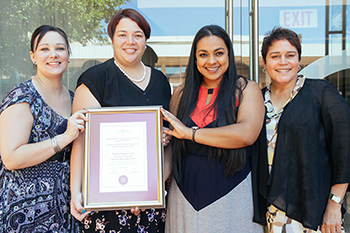Latest News Archive
Please select Category, Year, and then Month to display items
02 January 2025
|
Story Gerda-Marie van Rooyen
|
Photo Supplied
 Leading the research in South Africa is Prof Linus Franke from the Department of Soil, Crop and Climate Sciences.
Leading the research in South Africa is Prof Linus Franke from the Department of Soil, Crop and Climate Sciences.
Scientists are actively pursuing the successful breeding of diploid hybrid potatoes from inbred lines. This is expected to revolutionise potato breeding as it holds the key to rapid genetic progress. It will introduce new varieties for commercialisation through seed. Currently, existing potato variants have a gene that renders self-pollinated seeds infertile.
Prof Linus Franke, an academic in the Department of Soil, Crop and Climate Sciences at the UFS, is leading the research in South Africa. “This technology allows the production of genetically uniform potato seed that is easy to transport and largely disease-free.” He says this differs from conventional breeding whereby only vegetative propagation is possible due to tetraploid varieties in potatoes. It also risks carrying pests and diseases from one generation to the next – leading to the accumulation of pests and diseases with each round of multiplication.
Seed innovation
Prof Franke explains that Solynta BV, a seed company based in the Netherlands that produces potato varieties that can be grown from seed, has included South Africa in their research efforts because it is one of Africa’s largest producers and exporters. Through his academic relationship with Wageningen University and Research, a Dutch institution renowned for its agricultural endeavours and food production, the UFS became involved in researching hybrid potatoes grown from seed.
Diploid seeds containing two sets of chromosomes allow easier gene manipulation to increase predictability and speedier genetic progress. The breeding approach enables the incorporation of tolerance to pests, diseases, abiotic stresses (cold, heat, drought) and other desired genetic traits.
Although Prof Franke is optimistic about this research, he is not blind to disadvantages. “Potato seeds are tiny and have little energy reserves, making it harder to grow potatoes from seed than from tubers.” He says potatoes from seed will take longer to cultivate than tubers, as farmers need to grow plantlets from seeds first, adding six weeks to the growing period. “It is possible that commercial farmers can grow potatoes directly from seed. Alternatively, perhaps more likely, specialised growers will produce tubers of potatoes from seed; these tubers are then sold as seed tubers to other potato farmers, who then continue their normal practices of producing potatoes for the market from tubers.”
Financial benefits
Prof Franke says farmers have reason to get excited. “Seed potatoes will reduce input costs, as varieties with enhanced tolerance to pests and diseases require less pesticides. Planting one hectare of potatoes requires three to four tonnes of potato tubers, but only one 25 g packet of potato seeds.” Since potatoes are a more valuable commodity than maize, this technology might also increase farmers’ income potential.
Communication Science lecturers walk away with Best Teachers Award
2015-11-26

The winners: Jolandi Bezuidenhout, Rentia Engelbrecht, Jamie-Lee Nortje with Prof Milagros Rivera (Head of Department of Communication Science). |
Jolandi Bezuidenhout, Rentia Engelbrecht, and Jamie-Lee Nortje are the names behind the award-worthy A-Step programme. These lecturers in the Department of Communication Science at the University of the Free State (UFS) have been facilitating extra class for students in the extended programme since 2008. On 12 November 2015, they celebrated a major milestone when the programme received the Excellence in Teaching and Learning Innovation Award.
The annual awards are hosted by Dr Lis Lange Vice-Rector: Academic at the UFS, and administrated through the Centre for Teaching and Learning (CTL).
It was the first time that the Faculty of the Humanities had received the award. The lecturers were named the Best Teachers in the UFS, emerging in first place in the category: Student Engagement and Learning.
The A-Step sessions form part of a governmental programme dedicated to supporting students by offering diverse curriculum-related activities. Students attend two classes per week where they are equipped with language and life skills. As of 2015, the sessions were expanded to benefit not only the extended programme but all 788 students in Introduction to Verbal and Nonverbal Communication (KOM114).
“The activities are based on theoretical work we do in the mainstream classes,” explained Nortje. Primarily, the activities are meant to “help the student engage the work in a meaningful way so that they can understand it,” she said, which is why the sessions are designed in a fun and creative way.
The ‘Best Teachers’ organised and developed the A-Step sessions collectively and diligently over the years. The award, and the improved students’ academic performance, bears testimony to the effectiveness of their teaching style.
Marissa Grobbelaar, the Academic Staff and Development Project coordinator at the CTL, commended the lecturers’ efforts. Grobbelaar believes that “the way they approached their teaching and the passion which was evident in it,” was one of the reasons they deserved the award.
A former A-Step student, Rorisang Sekhasa, attested that, “the programme was very helpful because you get to have one-on-one sessions with your lecturer, and understand the work better. What was done in class is elaborated on in detail.”